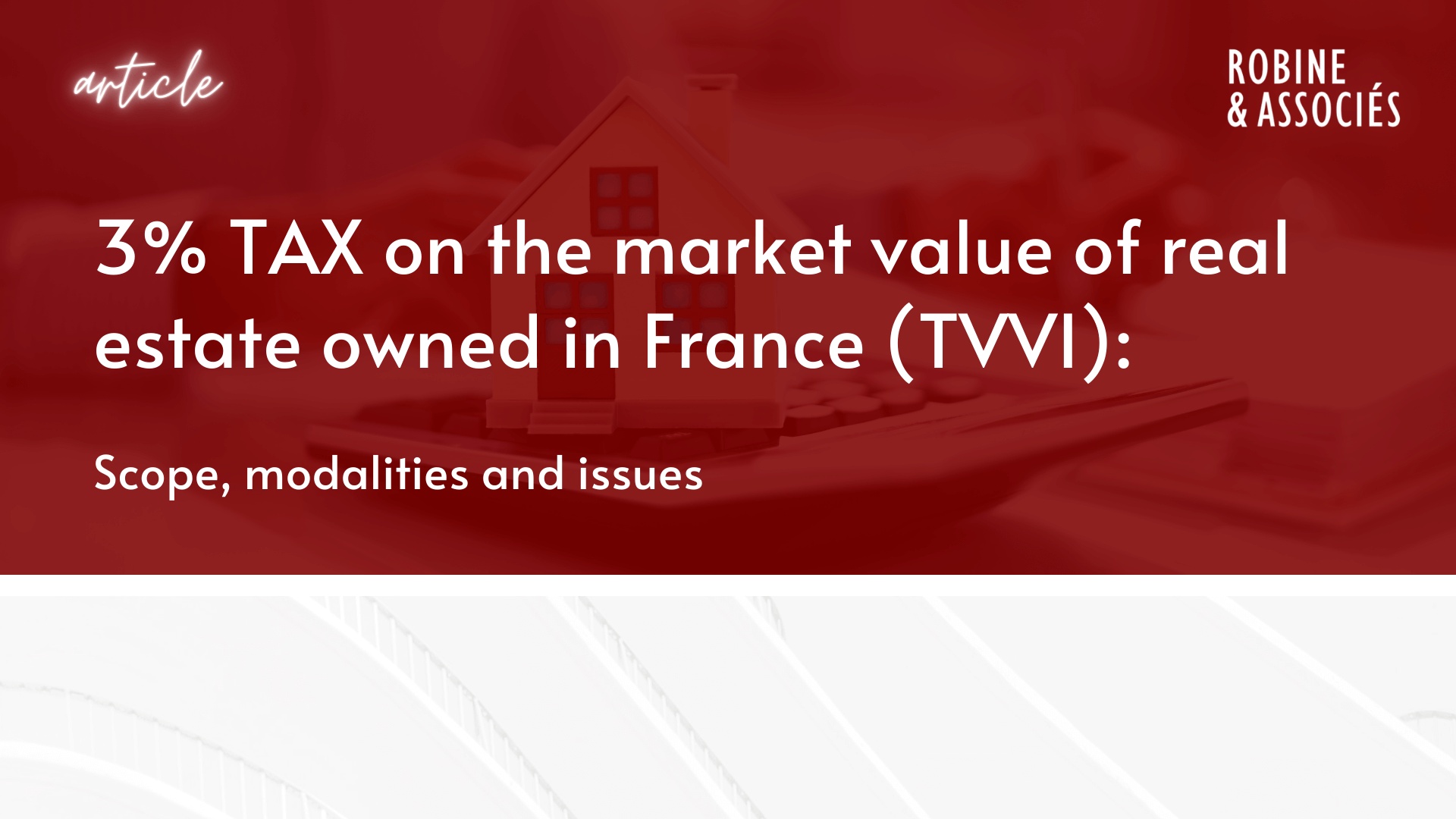3% TAX on the market value of real estate owned in France (TVVI): scope, modalities and issues
The tax on the market value of immovable property held in France by legal entities (TVVI), is an annual tax whose amount is equal to 3% of the market value of immovable property or real estate rights owned by legal entities, directly or through an intermediary.
The purpose of the introduction of this tax was to avoid the circumvention of the payment of wealth tax (ISF) replaced by the real estate wealth tax (IFI) since 2018, the tax on capital gains or the payment of inheritance tax.
The objective was therefore twofold: to fight tax evasion while generating new tax revenues.
The TTVI – or 3% TAX – therefore indirectly targets individuals who would seek to conceal the holding of their property and real estate rights in France in entities located in tax havens.
This tax is codified in Articles 990 D to 990 H of the French General Tax Code.
Who is liable for the 3% tax?
The TTVI or 3% TAX is payable by legal entities owning one or more buildings located in France or are holders of rights in rem relating to these assets. The legal entities concerned are as follows:
- legal entities, whether French or foreign;
- organizations, such as public institutions, associations, foundations;
- trusts or similar institutions.
The 3% tax thus targets entities with a preponderance of real estate – when the assets represent more than 50% of the value of a company – whose registered office is located in France or abroad.
What is the tax rate and base?
The taxable amount of the 3% TAX on the market value of the immovable property or real estate rights owned in France by the legal entity on January 1st of each year.
In particular, the following are considered to be real estate assets and rights:
- built-up buildings (such as houses, apartments, commercial premises, offices, etc.);
- undeveloped buildings (such as land, forests, etc.);
- rights in rem relating to immovable property (such as usufructs, rights of use or enjoyment, temporary dismemberment, life annuities, mortgages, etc.).
What are the cases of exemption ?
The French General Tax Code provides for a number of cases of exemption from the 3% TAX. This tax is therefore not applicable to:
Legal entities that are exempt by nature, regardless of their location
- International organizations, sovereign states, their political and territorial subdivisions and the legal entities they majority control;
- Legal entities that cannot be considered as predominantly real estate, i.e. whose real estate assets located in France represent less than 50% of French assets held directly or indirectly;
- Legal entities whose shares, shares and other rights are subject to meaningful and regular trading on a regulated market, as well as legal entities in which these entities directly or indirectly hold the entire share capital;
Exempt legal entities if the registered office is located within the European Union or in countries with bilateral agreements
Legal entities having their registered office in France, in a Member State of the European Union, in a country or territory which has concluded an administrative assistance agreement with France to combat tax evasion and tax evasion or in a State which has concluded a treaty with France allowing them to benefit from the same treatment as entities having their registered office in France, and :
- Who directly or indirectly hold a share of immovable property located in France or rights in rem relating to such property whose market value is less than €100,000 or 5% of the market value of said property or other rights;
- Or which are set up for the management of pension schemes or which are recognised as being of public utility or whose management is disinterested, and whose activity or financing justifies the ownership of immovable property or real estate rights;
- Or which take the form of REITs or SPPICAVs, or legal entities subject to equivalent regulation, provided that they are not constituted in the form of professional real estate collective investment undertakings (c) of 3° of Article 990 E of the FTC;
- Or who communicate each year or take and comply with the undertaking to communicate to the tax authorities, at its request, the location, the substance and value of the real estate owned on January 1st as well as the identity, address and number of shares held by all shareholders, partners or other members holding more than 1% of the shares, pursuant to d) of 3° of Article 990 E of the FTC.
Legal entities that file a declaration containing the information provided for in d) of 3° of Article 990 E of the FTC (see previous paragraph) are exempt from filing a form n° 2746. This is the case for legal entities that file a declaration n° 2038 or n° 2072 each year.
What are the declarative methods?
Since January 1st 2021, Article 76 of the 2017 Amending Finance Act, codified in XII of Article 1649 quarter B quarter of the FTC, has provided for an obligation to make an online declaration for the above-mentioned declaration n° 2746-SD and the aforementioned deed of commitment provided for respectively in e) and d) of 3° of Article 990 E of the FTC.
The declaration must be made before May 15 of each year. It must indicate the address, the substance and the market value of the immovable property and real estate rights on January 1st.
What are the sanctions?
Taxpayers who have not subscribed to declaration no. 2746-SD or who have not made a commitment even though they are required to do so in order to benefit from a 3% TAX exemption are required to regularize their situation within 30 days. If the deadline is exceeded, the fee is automatically due.
Entities failing to report may, in addition to paying the fee, be subject to surcharges and default interest. Even if the company has ultimately provided the information establishing that it is not liable for the 3% TAX.
Moreover, the tax authorities can show tolerance for these entities by accepting the regularization for the first and only time. In this case, they can benefit from an exemption from tax at the time of the first adjustment.
The 3% TAX rate is supposed to be a deterrent compared to the IFI rate, which cannot exceed a maximum of 1.5% of the value of property and real estate rights.
In the event of an audit, the market value of real estate assets and rights is determined by the tax authorities based on market prices. It can be based on the sale prices of properties deemed similar in the same geographical area, or on an estimate that it makes itself.
Prior to the 3% TAX declaration and in view of the financial stakes in the event of a tax audit, the assistance of a tax lawyer or a tax representative as well as the realization of an estimate by a real estate valuation expert can naturally be relevant. On the one hand, to determine the market value of the property in order to avoid overvaluation or undervaluation and to prove good faith, on the other hand, with a view to defending its best interests.
Ressources
FAQ on IVTV – Public Finance website







